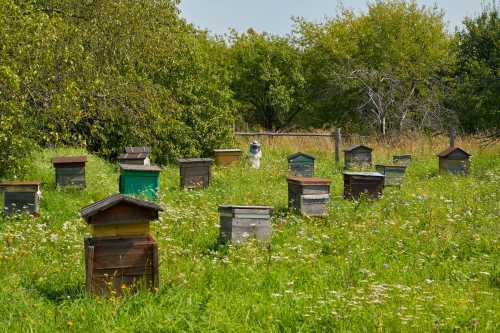How To Start An Apiary
If you are wondering how to get started with an apiary, here are some practical considerations to take into account, including the laws surrounding keeping bees and selling honey.
Starting An Apiary
You can start an apiary as a business or a hobby, but whether or not there's a commercial goal, there are some factors and regulations that apply regardless.
If you're thinking of starting an apiary business, create a business plan
A major part of your preparation will be to create a business plan. A business plan will help you define your goals, and plan out the actions, costs and opportunities involved in a structured way.
Apiary design
Whether or not you wish to make your apiary into a business, you'll still want to pay attention to its layout. Pollen, nectar and water are some of the things your bees will need access to. Your hives will also need shelter from adverse weather conditions.
This topic is covered in greater detail elsewhere, see Apiary Design.

Apiaries and the law
Depending on where you live in the world, there may be specific requirements in law that you may have to comply with if you wish to start an apiary.
It's especially important to be aware of these laws if you are considering turning a beekeeping hobby into a business. The laws are there to protect all beekeepers and their bees, including yours, as many of the regulations focus on important issues, such as bee diseases, importation of bees, labelling of honey and how bees are kept.
In the USA, according to the Illinois General Assembly wesbite, (510 ILCS 20/) Bees and Apiaries Act here is a legal definition:
"Apiary" means a place where one or more hives or colonies of bees are kept.
(from Ch. 8, par. 123a)
Some key points to start with are:
(510 ILCS 20/2) (from Ch. 8, par. 124)
Sec. 2. (a) Every person keeping one or more colonies of bees shall register with the Department annually.
(b) Every person keeping one or more colonies of bees may be required to post his or her registration number in a prominent place within each apiary under his or her control.
(Source: P.A. 88-138.).
(510 ILCS 20/2-1)
Sec. 2-1. Nuisances. All bees, colonies, or items of bee equipment, where bee diseases, bee parasites or exotic strains of bees exist; or hives that cannot be readily inspected; or colonies that are not registered, are declared to be nuisances to be regulated as prescribed by the Department.
There are strict rules regarding importing of bees, transportation of bees and equipment, bee inspections and bee diseases.
It's very important to know the rules of the state in which you live. The key point is to become fully aware of your responsibilities and any restrictions applying in your region.
There may also be specific rules in relation to particular areas, such as bee Apiary Inspection Regulations. These may cover laws with regard to maintenance of hives, disease control, and again, matters relating to transportation of bees and other matters.
Further information for US and Canada is provided on the website of the Apiary Inspectors Of America.
Honey Labelling Regulations
For good reason, there are laws governing standards and labelling of honey and honey products.
If you live in the USA, do take a look at: Proper Labeling of Honey and Honey Products: Guidance for Industry from the FDA.
UK Laws
If you live in the UK, a good place to start is: BeeBase Bees and the Law. The website provides a list of relevant regulations, including The Bees Act 1980, and The Bee Diseases and Pests Control Orders 2006 and 2021, along with a the regulations for honey labelling and standards.
If you found this page helpful or interesting, I'd really be grateful if you would share it with others - if not this page, perhaps another, such as Gardening For Bees.
Thank you so much :) .